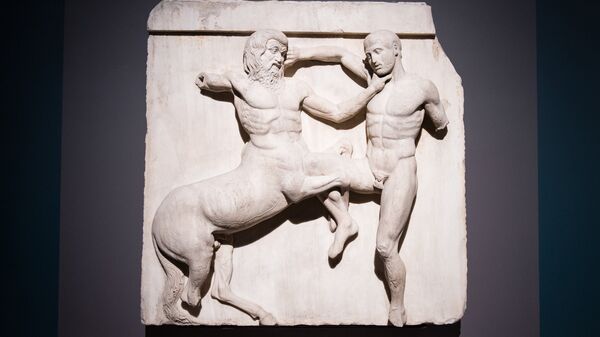The President of the Athenians' Association Eleftherios Skiadas told Sputnik that returning the marbles is a "matter of justice".
"The Parthenon is a global symbol and therefore we believe that the European Court of Human Rights will not cave under the mounting pressure and treat this as a minor matter but will instead rise to the occasion and address it."
Skiadas told Sputnik that the Association has been asked for additional information, which "is a clear sign that they [ECtHR] are taking the matter seriously".
The Parthenon temple in Athens sits at the top of the Acropolis, a site dedicated to the Greek goddess Athena, marking the Greek’s victory over Sparta in the 5th century BC.
Bring them back 🇬🇷 #ElginMarbles pic.twitter.com/EEPnJE2hm2
— BlissWeirdo (@BlissWeirdo) February 15, 2016
Marble friezes and statues that once adorned the pediments and pillars of the Parthenon are now on permanent display in the British Museum in London. Some say they were pillaged – others believe they were saved.
So wonderful for London to hold these great treasures for all the world to see for free.#ElginMarbles pic.twitter.com/DKAsb6gSlp
— Lummel (@fuzzle7777) January 9, 2016
Greece claims they were stolen by Lord Elgin in the early 1800s when he was the British Ambassador to the Ottoman Empire. Lord Elgin claimed he removed the sculptures under the permission of the Ottoman authorities, saving them for the sake of history while the temple fell into ruin.
In 1816, the British government approved the legality of the acquisition, and the marbles have been on display in London ever since.
200 years ago…Parliament passed an Act to vest the #ElginMarbles to the trustees @britishmuseum for public view https://t.co/29rm5UaZk1
— Parliament Archives (@UKParlArchives) January 19, 2016
The Trustees of the British Museum are convinced that the "current division allows different and complementary stories to be told about the surviving sculptures, highlighting their significance within world culture and affirming the place of Ancient Greece among the great cultures of the world". According their statement on the British Museum website:
"Each year millions of visitors, free of charge, admire the artistry of the sculptures and gain insight into how ancient Greece influenced – and was influenced by – the other civilizations that it encountered."
However, Skiadas believes that the UK is starting to see things a bit differently, considering that Greece now has advanced facilities to safely display the Parthenon marbles.
"It would be a culturally significant step for the UK to join us in a public and transparent discussion on the Parthenon marbles."
Bring Them Back
Greece wants the marbles back – they always have — and now the historical Athenians’ Association has instructed proceedings against the United Kingdom at the European Court of Human Rights. The 120 year old group is made up of natives Athenians and ancestors of those who stood up to the "despoilment" of the Parthenon by Lord Elgin at the time.
I've always said Britain should return Elgin Marbles etc with some British historical artifacts as a peace offering.
— ugh life (@whatkatie_did) January 26, 2016
The association claim that the retention of the Parthenon Marbles by the British government violates the following articles under the Human Rights Act:
"Article 8, violation of cultural identity as an aspect of the right to respect for a private life; Article 9, violation of the cultural identity under the freedom of conscience right; Article 10, violation of the right to access cultural information under the right to freedom of expression; and article 13, violation of the right to an effective remedy and Article one, violation of the right to property, in the sense of integral public access to the monument."
In a statement the Athenians’ Association said that it is "aspiring to raise international public awareness", hoping that the "monument will be restored and that history and tradition will shine forth for the good of mankind".
I am greek and i want to go home! È ora di tornare a casa! #greece #greceeagapi #elginmarbles pic.twitter.com/NSbeZe8aFI
— ailinon80 (@ailinon80) February 18, 2016
The action follows another recent refusal by the British government to return the sculptures – or even enter "mediation" over the marbles.
The UK claim that the sculptures "were legally acquired by Lord Elgin according to the then prevailing laws" and that the British Museum has a proprietary right as it purchased them". A decision, the Athenians’ Association is now appealing.
"The global community needs to actively participate and make the return of the Parthenon marbles a celebration and a message of civilization and peace," Skiadas told Sputnik.




